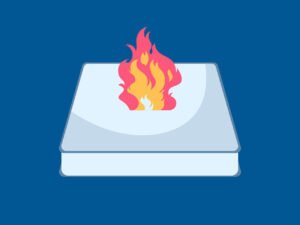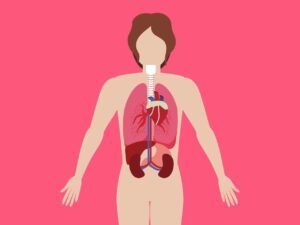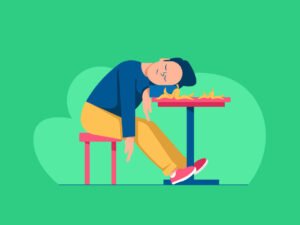Constipation is a very common health condition, but that doesn’t mean that it can’t be debilitating.
When you are dealing with constipation, it can affect the quality of your life and can lead to serious health problems if left untreated.

There is lots of advice about how to relieve your constipation, but one aspect that you may not have thought about is the effect that your sleep position can have.
The link between sleep and constipation is quite well-established, so taking care of how you sleep could help you recover from constipation more quickly.
So let’s take a look at the best position to sleep for constipation.
Contents
What is Constipation?
Constipation is when you have difficulty emptying your bowels.
One important thing to remember is that everyone’s bowel habits vary, so it is always important to keep that in mind when deciding if you are constipated.
For example, some people have bowel movements multiple times a day, whereas others can comfortably have them every couple of days.
Symptoms of Constipation
- Emptying your bowels less than 3 times a week
- Stool that is large, dry, hard, or lumpy
- Straining or in pain when emptying your bowels
- A sense that your bowels haven’t emptied properly after going to the toilet
- Stomach ache
- Bloating
- Nausea
What Causes Constipation?
One of the reasons why constipation can be quite difficult to treat is that the causes of constipation can be quite difficult to pin down.
Constipation can have a wide range of lifestyle triggers and physical triggers, so you will often need to identify if changing anything in your lifestyle can help reduce your constipation.
- Not drinking enough
- Not eating enough fiber
- Not being active enough and spending a long time sitting and lying down
- Ignoring the urge to go to the toilet too often
- A change to your diet
- Anxiety and depression
- Medication
- Pregnancy
- IBS
- Underactive thyroid
- Neurological conditions
- Cancer
Complications of Constipation
If you do have constipation, it is important that you get it treated as soon as possible.
Untreated constipation can lead to serious complications, such as:
- Hemorrhoids
- Anal fissure
- Fecal impaction
- Rectal prolapse
How to Treat Constipation
Once you have constipation that has lasted a little while, getting back to normal can take some time.
The nerves and muscles in your digestive system can lose some of their sensitivity and may need to be retrained to respond to cues that you need to empty your bowel.
In most cases, however, your constipation will go away.
Some ways to treat constipation are:
- Laxatives – there are a variety of types that have different effects so you may be prescribed a combination.
- Drink more water.
- Do more exercise.
- Eat more fiber. If you for some reason you can’t, at least consume it as a supplement.
- Do not delay when you feel the urge to empty your bowels.
- Have a regular time to go to the toilet – around 40 minutes after eating and first thing in the morning are good times to go.
How Sleep Affects Constipation
View this post on Instagram
One of the lifestyle factors that is often overlooked when it comes to constipation is sleep.
The connection might not seem obvious at first because sleep and digestion can seem disconnected, but, actually, they are very closely linked.
When we are asleep, our bodies don’t just stop doing anything.
Some active and important processes happen while we are sleeping, some of which are related to digestion.
1) When we are in the REM stage of sleep, there is faster gastric emptying.[1]
This means that our stomach contents enter our intestines at a faster rate.
So the process by which food is passed along our digestive tract speeds up.
2) There is a more regular intestinal movement[2] throughout the night while we are asleep, which can help keep our bowel movements more regular.
3) There is a growing body of evidence showing that poor sleep can have a dramatic impact on our gut health, and specifically constipation.
It is well known that poor sleep can affect constipation in people with IBS,[3] but there is also evidence that it can also trigger constipation in otherwise healthy people.[4]
4) Lack of sleep can also affect other conditions that can indirectly impact constipation.
For example, sleep problems can trigger anxiety,[5] which can cause constipation.
5) Sleep is important for regulating the hormones that control our hunger and eating.
A lack of sleep increases the level of ghrelin (which makes us feel hungry) and decreases the level of leptin (which makes us feel full).
So we are more likely to overeat when we haven’t had enough sleep,[6] and because our inhibitions are lowered, the types of food we choose may not be the healthiest.
When we are tired, we tend to crave foods that are low in fiber and high in saturated fat,[7] both of which can make constipation worse.
So those are the ways that sleep itself is associated with gut health and constipation, but what about the way that we sleep?
Can the position our bodies are in really affect our constipation? Let’s take a look.
Body Positions and Constipation
It is easy to forget that inside our bodies, there is a really complex network of physical processes happening, and the way we position our body on the outside can absolutely affect the way things work on the inside.
Let’s take a quick biology recap first.
Bowel movements are the last step in the digestive process that happens whenever you eat or drink anything.
The food you eat moves from your stomach to your small intestine, where your body absorbs all of the nutrients that it needs along its 20 feet journey through the intestine.
All the leftover waste then moves into your colon (also known as your large intestine), where it sits while water is removed.
After a day or two, this waste is then expelled through your rectum and anus.
When you are constipated, the waste stays in your colon for too long.
The longer it is sat there, the drier and harder it becomes, which can make it more difficult for your body to get rid of it.
This is where you can get into that vicious cycle that can make constipation chronic.
So how can the way you hold your body affect how your digestion works?
Well, the most obvious is that the way you hold yourself on the toilet can have a big impact on how easy it is for you to have a bowel movement.
In recent years, there has been a big push to encourage people to use a more natural squatting position, rather than the normal seated position that most of us use on the toilet.
The squatting position angles your colon and rectum in the most natural position to allow the stool to exit as easily as possible.
If you don’t have a “squatty potty,” you can mimic this position by placing your feet on a small stool and raising your legs to your waist.
But what about when you’re not on the toilet?
Remember that the waste material goes on a long journey throughout your digestive system, so helping it along by positioning your body in the right way has the potential to help speed things up a little.
And when are you in the same position for the longest period of time? When you are asleep.
The Best Position to Sleep for Constipation
As we have covered, there is a very close link between sleep and digestion.
The most important thing for you to prioritize when it comes to sleeping and aiding your constipation is to make sure that you have enough of it.
Easier said than done, of course, with our busy, stressful lifestyles, but getting enough sleep has such a huge knock-on effect on your digestion.
So while some sleep positions can be better for getting your digestion moving, if they aren’t comfortable enough for you to get a good night’s sleep, then you might be better off using a different one.
With that being said, let’s take a look at which body position is the best.
You may not have put much thought into the position that you go to sleep in before, but there are three main sleep positions that people use:
- Side sleeping
- Back sleeping
- Stomach sleeping.
These different sleep positions can actually have quite a large impact on our health and wellbeing, even if it may not feel like it at the time.
The majority of people sleep on their side, and there may be good reasons for this.
Sleeping on your side can help to reduce your chance of neurological disease, sleep apnea, and heartburn.
And which side that you sleep on can even have an impact on your health.
This is because our internal organs are not symmetrical.
There are differences in how our organs lie on each side of our body.
Sleeping on your right side can help to reduce the symptoms of heart failure[8] because of where your heart sits inside your chest.
But if your problem is with your digestion and constipation, then sleeping on your left side is the best choice for you.
Why sleeping on your left side can help with constipation
Your stomach is located on the left side of your body.
So when you sleep on your left side, the food movement throughout your digestive tract is aided by gravity.
This can reduce the symptoms of a variety of digestive issues,[9] including constipation.

One of the most productive times for bowel movements is first thing in the morning, so if you can sleep most of the night on your left side, this will mean that the food and waste material will have moved faster through the stomach and small intestine and should be waiting patiently in your colon ready for when you get out of bed.
Sleeping on your back can make the situation worse because gravity is pulling in such a way that it can keep everything stuck where it is for longer, which can cause an increase in a variety of gastrointestinal symptoms.[10]
Sleeping on your stomach, however, could be the worst position to choose if you’re constipated.
Not only are you compressing your stomach and digestive system with the weight of your body, but you can also give yourself lower back pain because of the curve of your spine, which itself can cause constipation.[11]
You may not be able to stay sleeping in the same position all night long, but generally speaking, the position you fall asleep in is the one you stay the longest in throughout the night.
So going to sleep on your left side increase the chances that you will sleep on that side for a good chunk of time.
You can also glue a tennis ball on your back or stomach or wear the Stop Snoring T-Shirt to prevent yourself from turning at night.
If sleeping on your side is uncomfortable for you, placing a pillow between your knees can help to keep your spine aligned and even out the pressure on your joints so you get a rested night.

Summary
- Constipation can be caused by lifestyle factors.
- Sleep is strongly associated with good digestion, and lack of sleep can contribute to constipation.
- The way we hold our bodies can affect how well food moves through the digestive system.
- Sleeping on your left side is the best position to help constipation because it allows gravity to help move the food and waste through your digestive system.
- Back and stomach sleeping can both make constipation worse.
Final thoughts
Constipation can be really uncomfortable and can lead to quite serious health problems if left untreated.
While your sleep position might not be the only thing you will need to treat your constipation, it can be a useful tool to add to your arsenal alongside other treatments.
And the best position to sleep for constipation is your left side.



